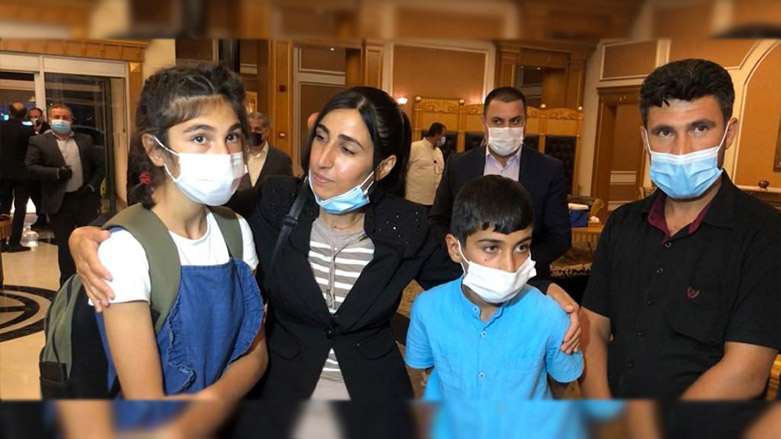Two Yezidi children found in Turkey reunite with family in Kurdistan Region

ERBIL (Kurdistan 24) – Two Yezidi (Ezidi) children, Emir and Emira Hudeda Huseyin, whom members of the so-called Islamic State abducted years ago, returned from Turkey to the Kurdistan Region on Friday alongside an official Kurdish delegation led by President Nechirvan Barzani.
“The two siblings, a boy, and a girl accompanied the Kurdistan Region delegation headed by President Nechirvan Barzani as it arrived back to Erbil from an official visit to the Turkish capital Ankara,” a statement from the Kurdistan Region Presidency said.
“Upon arrival at Erbil International Airport, the two children reunited with their family and relatives.”
The Yezidi Rescue Office, established by Barzani, has, for the past three years, been reportedly exerting intense efforts to find the two children.
“With the help of and relevant authorities of the government of Turkey, and humanitarian organizations, the office managed to locate the two children and return them to their family in the Kurdistan Region,” the statement added.

“The Kurdistan Region Presidency and the office of President Nechirvan Barzani thanked everyone who helped find the children and solve their case.”
Barzani also expressed gratitude to Erbil and Ankara authorities “for their prompt assistance in finalizing the necessary paperwork and legal procedures in time for them to return to the Kurdistan Region today.”
The Central Council of Ezidis in Germany said in a statement on Friday that after the Islamic State killed the parents of Emir and Emira in Sinjar, then four and six years old, they handed over the two to a Turkmen family in the terrorist organization.
“These children have been in Turkey since 2017, only through DNA testing it was proven that these children were the lost Ezidi children.”
Turkey’s Ambassador to Berlin, Ali Kemal Aydin, on Friday confirmed the news of the children’s return to the chairman of the Central Council of Ezidis in Germany.
In the past, the Central Council of Ezidis head Dr. Irfan Ortac and board member Ozan Demirli visited Ankara several times, including visiting Turkish lawmaker Mustafa Yeneroğlu from the ruling Justice and Development Party (AKP) and asked for the return of these children.
However, Turkey reportedly rejected this initially.
But this time, Turkey agreed to it after the visit of the Barzani-led delegation’s visit.
“Today, they were united with their surviving sister and brother in Erbil,” Kurdistan Region Presidency chief of staff Fawzi Hariri, wrote in a tweet. The president’s Yezidi Task Force “continues to search for other [victims].”
Since 2014, the Kurdistan Region’s Ezidi Rescue Office has saved over 3,537 Ezidis of both genders out of the 6,417 members of the terrorist organization kidnapped. Out of the total, 2,880 are still missing, 1,304 of them are female, and 1,576 are male.
In the last few months, a number of Yezidi survivors have been found in Turkey and returned to the Kurdistan region.
The emergence of the Islamic State and its violent assault on Shingal in 2014 led to the displacement of hundreds of thousands of Ezidis. Most of them fled to the Kurdistan Region, while others resettled to neighboring countries in the region or Western states.
Others were not as lucky and remained stranded in the war zone, where they experienced atrocities and mass executions at the hands of the extremist group for years. Militants subjected women and girls to sexual slavery, kidnapped children, forced religious conversions, executed scores of men, and abused, sold, and trafficked females across areas they controlled in Iraq and Syria.
Before the 2014 attack, there were roughly 550,000 Ezidis in the Kurdistan Region and Iraq. As the militant group took over large swaths of territory in Nineveh province, 360,000 Ezidis escaped and found refuge elsewhere, according to the Office of Ezidi Abductees’ Affairs.
Editing by Khrush Najari
